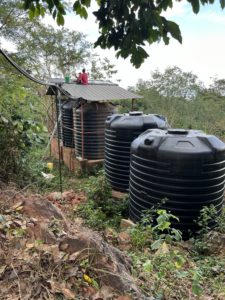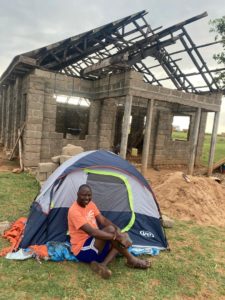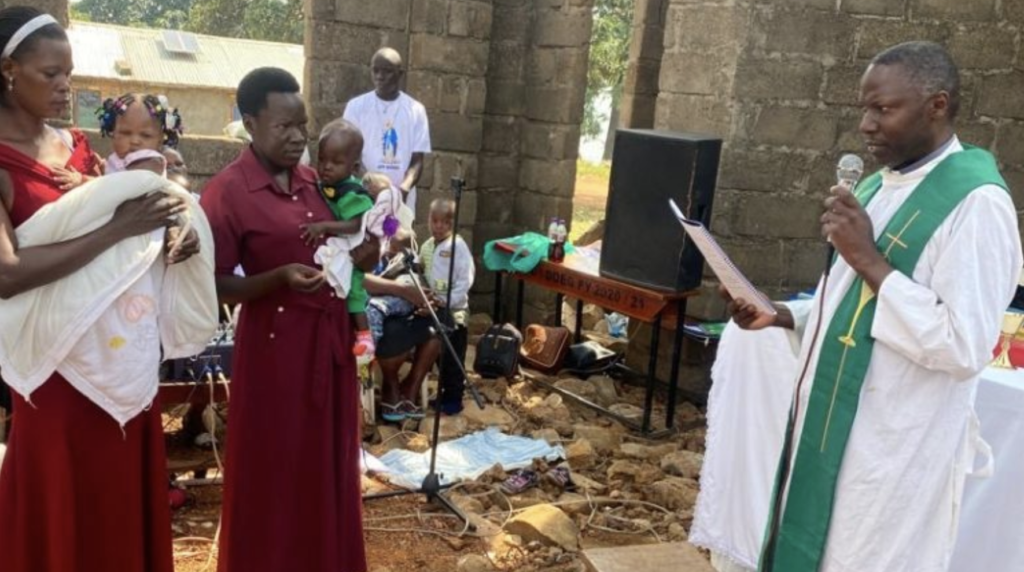Since he became a priest in the Archdiocese of Los Angeles 27 years ago, Father John Kyebasuuta marvels at what has changed — and what remains the same — every time he makes his annual trip to the Ugandan village where he grew up.
On one trip to his hometown on Buvuma Island in Africa’s famous Lake Victoria 10 years ago, Kyebasuuta was struck by the sight of a small boy struggling with a heavy container of water that he drew from a borehole miles away to help his family.
“My first thought was, ‘Oh my, that was me 40 years ago,’ ” said Kyebasuuta, the pastor at St. Thomas Aquinas Church in Monterey Park since 2013. “The more I thought about it, the more I wondered if I could make a difference. Water affects everyone.”
By 2019, Kyebasuuta did research and raised money to bring an efficient, solar-powered well to the island. Four 10,000-liter tanks atop a mountain use gravity to send water into five directions, easily accessed by a spigot. No more dangerous digging by hand of wells going 250 feet deep. No energy exerted with hand pumps.
Power drills, pipes, and tanks had to be imported, but Kyebasuuta felt it was worth the $20,000 cost. Especially since his mother, Anna, who turned 99 in March and still lives in a small jungle home, would benefit. Kyebasuuta, 57, is the 10th of 13 children in his family.
Then came last July, when Kyebasuuta arranged for a four-month sabbatical to go home, hoping he could accomplish more than just feeding cows and picking produce on his family farm.
He began by overseeing the construction of a fifth water-well project for the 75 families of Bubere Village, who traveled long distances to a stream shared with animals as the only source.
The well is a spiritual fulfillment for him as well.

“Water is sacramental in the Church, and from what I’ve seen, it can bring a new baptism to these people and improve the quality of life everywhere,” he said. “Water-borne diseases disappeared. Irrigation was better. Animals no longer had contaminated water — all the pigs used to be a shade of pink with kinky hair, but they became white with straight hair after just six months. Everything changed.”
Things got more interesting when he was asked to celebrate Masses on the distant islands of Namiti and Ziiru, two hours away by boat. On one trip, Kyebasuuta followed a group of fishermen to a primitive mud-brick structure in an open field.
“To my surprise, this was a church,” he said, noting there was no front door, no windows, and large rocks covered the floor. Worse, only the scaffolding of a roof was above. The locals working on this for the last five years ran out of funding and materials.
“With my American mindset, I knew this wasn’t safe,” he said.
Kyebasuuta’s connections came through again. He camped for a week in a small tent outside the church and oversaw completion of a sturdy sheet-metal roof. He also resourced a new altar, ambo, and a presider’s chair made of metal (termites had eaten through the wooden ones). Local families broke apart the stones by hand and carried out the debris to make way for a concrete pour.
As the materials came by boat, donations helped purchase a new high-powered outboard motor to make deliveries happen faster. After Kyebasuuta returned from Uganda in November, the work continued. He wrote a story for the parish bulletin, and his Monterey Park community stepped up with more donations.
“He is an amazing priest and I love supporting him,” said Msgr. John Moretta of nearby Resurrection Church in Boyle Heights. That parish helped Kyebasuuta fund a 2022 well project near the St. Joseph Catholic Education boarding school for orphans and homeless affected by the local civil war.
“When he came to show us what he was doing, he guaranteed when we came to visit Uganda, we would have free water for the rest of our lives,” Moretta said.
Since the Eaton Fire burned hundreds of homes, Kyebasuuta has seen more families move from Altadena to become part of St. Thomas Aquinas Church. And he finds their priorities have shifted.
“There is more of an awareness in the world of what we have,” said Kyebasuuta, who first came to the U.S. at age 22 and was ordained a priest in 1998 by Cardinal Roger Mahony. “Domestically, and overseas, we see we can’t take things for granted.”
There’s one other unexpected event from Kyebasuuta’s sabbatical that he’s been recounting a lot lately.

As he was about to go to sleep around 11 p.m. one night, an urgent call came from a catechist on Ziiru Island — a pregnant woman going into labor needed help. She lived two miles up a winding mountainous road, now in pitch-black darkness.
For the next six hours, Kyebasuuta made calls. He found a motorcycle so someone could pick her up. He tracked down a boat with no motor. Then found a motor, but with no gas. They found gas.
Kyebasuuta’s friend in Kampala, Uganda’s capital city, had a pickup truck that could meet her at the shoreline and take her to a hospital. But as she was jostled around in the truck bed, she had to deliver quickly. A local midwife was found, met them at a dental clinic, and at 2:30 a.m., a boy named Pablo was born. Kyebasuuta had suggested the name to the mother.
“I never thought for a minute I would be coordinating a life-changing situation,” Kyebasuuta said, laughing. “Each person was called to action and did their part. It reminded me of the miracle of the wedding at Cana. People poured the water and wine was created. In a way, all we have to do is pour water and God will make the wine happen.”

